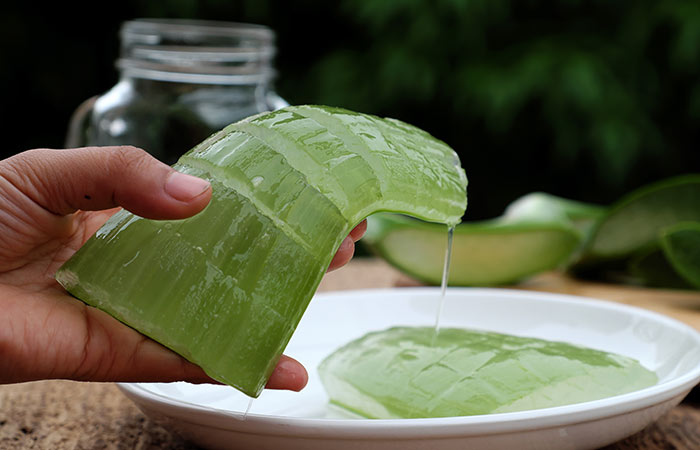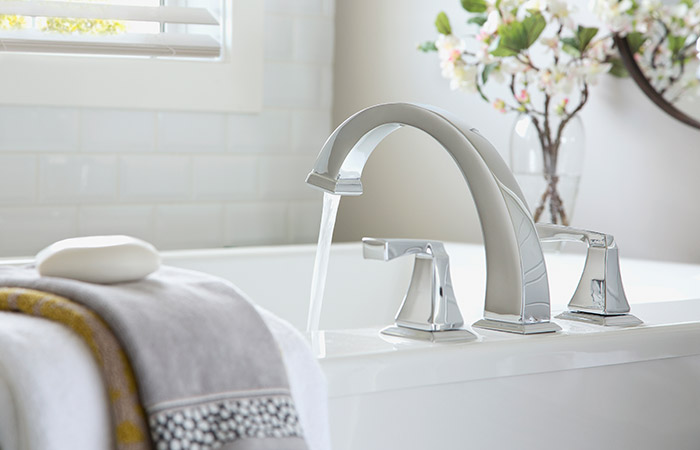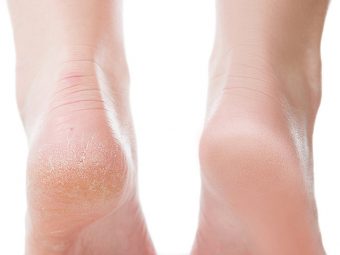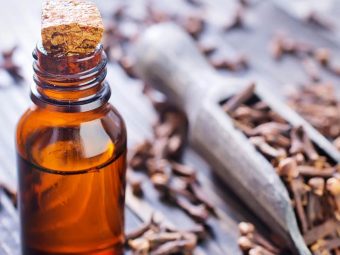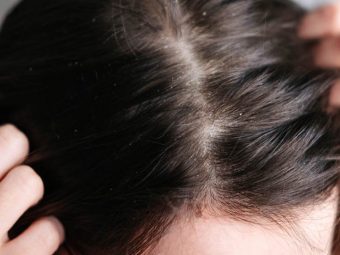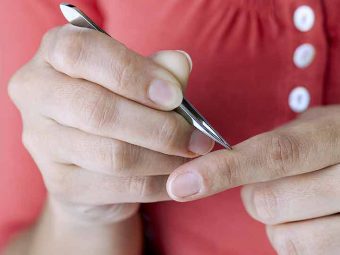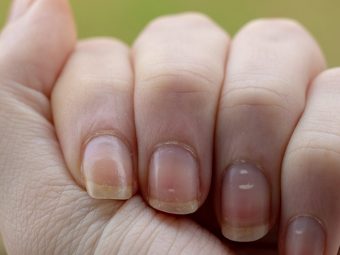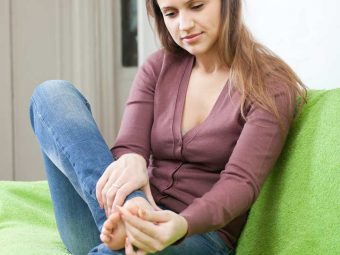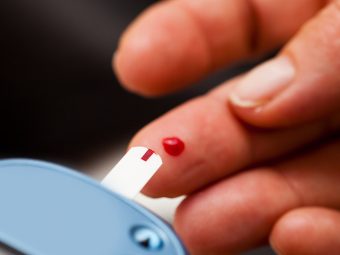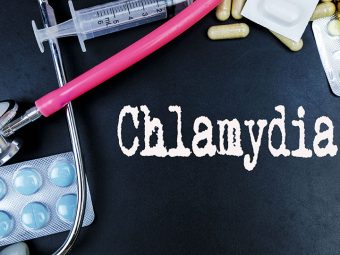Anal Fissures: Treatment, Home Remedies, And Prevention Tips
Identifying the causes and signs of these fissures is the first step towards treating them.
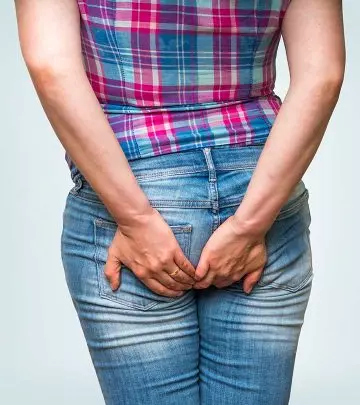
Image: iStock
The anal canal is lined with tissues, and an anal fissure is a tear in those tissues, which causes bleeding, itchiness, and rectal pain. Don’t worry. Anal fissure treatment generally involves a lot of self-care and can be managed with home remedies.
The most common reason for these fissures is constipation or diarrhea. However, these fissures can become chronic if untreated and damage the anal sphincter muscle tissues.
In this case, it is important to relax your anal sphincter and maintain regular bowel movements. In this article, we will explain what anal fissures are, the causes, how they are treated, and some diet tips for managing them. Read on.
In This Article
What Is An Anal Fissure?
An anal fissure is a slight tear that occurs in the moist tissue lining the anus. It is usually a result of passing hard or large stools during a bowel movement.
Anal fissures cause great discomfort and are often accompanied by pain and bleeding while passing stools. The ring of muscle at the end of your anus, also called the anal sphincter, may experience spasms due to such fissures.
The common causes of anal fissures are discussed below.
What Causes An Anal Fissure?
Anal fissures may be caused by:
- Passing hard or large stools during a bowel movement
- Constipation that causes one to strain during a bowel movement
- Anal intercourse
- Childbirth
- Chronic cases of diarrhea
The less common causes of anal fissures include:
- Inflammatory bowel diseases like Crohn’s disease
- Anal cancer
- Syphilis
- HIV
- Tuberculosis
Some factors may put an individual at a higher risk of developing anal fissures.
Risk Factors
The risk factors for anal fissures are:
- Childbirth – Anal fissures are quite common in women after giving birth.
- Constipation
- Age – While anal fissures may occur at any age, they are more common in middle-aged adults and infants.
Individuals affected by anal fissures tend to exhibit the following signs and symptoms.
Signs And Symptoms Of Anal Fissures
The signs and symptoms associated with anal fissures are:
- Pain during bowel movements, which may vary in severity
- Pain that lasts up to several hours after passing stool
- Blood spots in the stool (or toilet paper) after a bowel movement
- A noticeable crack in the skin around the anus
- Presence of a small skin tag on the skin near the anal fissure
Gene Veritas, a lifestyle blogger, recounts his experience when he had an anal fissure: “The pain usually lasted for hours and sometimes as long as half a day. I could not sit comfortably (i).”
If you experience any of these symptoms, it is best to get yourself diagnosed to rule out other possibilities.
How Are Anal Fissures Diagnosed?
To diagnose anal fissures, your doctor may ask about your medical history. This may be followed by a physical examination that includes a gentle examination of the anal region.
The fissure or tear is usually visible and can be easily diagnosed with a physical examination.
If an underlying condition is suspected, your doctor may suggest other diagnostic tests like anoscopy, flexible sigmoidoscopyi XA minimally invasive diagnostic test that checks the sigmoid colon or the lower part of the colon close to the rectum and anus. , or colonoscopy.
An acute fissure looks like a fresh paper cut, whereas a chronic anal fissure is a deeper tear that may be accompanied by internal/external fleshy growths. Anal fissures are considered to be chronic if they last for more than eight weeks.
Once diagnosed, you can discuss the available treatment options with your doctor.
Over-The-Counter Treatment For Anal Fissures
An anal fissure can ease within a few weeks if you make a few changes that will help in keeping your stool soft.
Over-the-counter (OTC) stool softeners are also available for treating the symptoms of anal fissures. They include:
- Topical ointments like nitroglycerine (Rectiv) that externally enhance blood flow to the fissure and promote healing.
- Topical use of anesthetic creams like lidocaine hydrochloride (Xylocaine).
- Botox (Botulinum toxin type A) injection to relax spasms by paralyzing the anal sphincter muscle.
- Blood pressure medications like oral diltiazem (Cardizem) or nifedipine (Procardia) to relax the anal sphincter.
Those with a chronic anal fissure that does not respond to OTC treatments may require surgery. A procedure called lateral internal sphincterotomy (LIS), which involves making a small incision to remove a portion of the anal sphincter muscle, is one of the most commonly used surgeries for chronic fissures.
A retrospective study on idiopathic anal fissure examined the effects of different botulinum toxin dosage regimens on healing. Among 1003 patients treated, 77.7% achieved complete healing at the 2-month evaluation. Resting anal tone significantly decreased compared to baseline. Patients not healed underwent sphincterotomy or were re-treated, resulting in a healing rate of 93.9%. The dose and injection site of toxin correlated with the healing rate. No relapses were observed over an average follow-up of 71 months, demonstrating the safety and efficacy of botulinum toxin for chronic anal fissure.
While surgery is the best option to treat chronic fissures, acute fissures can be easily managed and treated with the help of some natural remedies.
Home Remedies For Managing Anal Fissures
1. Coconut Oil
The emollient properties of coconut oil can help in keeping the affected area lubricated (1). This makes the passing of stool easier and also promotes the healing of the fissure.
You Will Need
1-2 teaspoons of virgin coconut oil
What You Have To Do
- Apply a little virgin coconut oil to the affected area.
- Leave it on.
- Reapply as necessary.
How Often You Should Do This
You may do this 1-2 times daily.
2. Olive Oil, Honey, And Beeswax
A mixture of olive oil, honey, and beeswax was observed to help manage the symptoms of itchiness and pain associated with anal fissures and even hemorrhoids (2).
You Will Need
- 1 teaspoon of honey
- 1 teaspoon of olive oil
- 1 teaspoon of beeswax
What You Have To Do
- Mix a teaspoon each of olive oil, honey, and beeswax.
- Apply the mixture to the affected area and leave it on.
How Often You Should Do This
You may do this 1-2 times daily.
3. Aloe Vera
The soothing and wound-healing properties of aloe vera can help in alleviating pain and rectal bleeding associated with anal fissures. It can also speed up the healing of the fissure (3).
You Will Need
1 teaspoon of aloe vera gel
What You Have To Do
- Extract a little gel from an aloe leaf and whisk it to form a paste.
- Apply the aloe gel to the affected area.
- Leave it on until it dries.
How Often You Should Do This
You may do this 2-3 times daily.
4. Warm Sitz Bath
A warm sitz bath can help in alleviating inflammation and the burning sensation that often accompany an anal fissure (4).
You Will Need
Warm water (as required)
What You Have To Do
- Clean your bathtub thoroughly.
- Fill it with 3-4 inches of warm (not hot) water.
- Soak in the tub for 15-20 minutes, with your perineum region fully immersed in the water.
- Pat your skin dry. Do not touch the affected area.
How Often You Should Do This
You can do this 1-2 times daily.
 Quick Tip
Quick Tip5. Flaxseed
Flaxseed can treat the symptoms of constipation (5). This makes it a great option to ease bowel movements and the symptoms of anal fissures.
You Will Need
½ – 1 tablespoon of powdered flaxseed
What You Have To Do
- Mix flaxseed with a glass of water and drink the mixture.
How Often You Should Do This
You may do this once daily.
5. Apple Cider Vinegar
Apple cider vinegar may just be the remedy you need to manage anal fissures as it helps ease bowel movements. A study observed that participants using the drug clozapine for schizophrenia faced drug interaction symptoms, such as constipation, that were improved on consuming apple cider vinegar (6).
You Will Need
- 1-2 tablespoons of raw, unfiltered apple cider vinegar
- 1 glass of warm water
- 1-2 tablespoons of honey (optional)
What You Have To Do
- Add 1-2 tablespoons of ACV to a glass of warm water and mix.
- Drink this mixture before a meal or in the morning on an empty stomach.
How Often You Should Do This
You may consume it 1-2 times a day.
Along with these remedies, following a proper diet also helps treat anal fissures and prevents their recurrence.
What Should You Eat To Prevent Anal Fissures?
A fiber-rich and laxative diet can help ease acute anal fissures that are caused by constipation.
Raw fruits, vegetables, and whole-grain bread are associated with a decreased risk of anal fissures. Consuming white bread, bacon, sausages, and sauces thickened with roux is associated with an increased risk of anal fissures (7).
High-fiber fruits like pear, grape, plum, and apple with the peel on can also be used to manage the symptoms of constipation due to their high-fiber content (8).
 Quick Tip
Quick TipInfographic: 5 Natural Ways To Manage Anal Fissures
Chronic diarrhea, constipation, and childbirth can cause anal fissures. This may result in bloody spots in the stool and pain during bowel movements. The good news is you can easily manage anal fissures at home with simple kitchen ingredients. Check out this infographic to know more!

Illustration: StyleCraze Design Team
An anal fissure is a painful condition caused due to damage to the sensitive tissues surrounding the anus. The most common cause of this condition is hard stools or constipation, where you experience pain after passing stools with blood in them. Anal fissure treatment includes topical application of soothing anesthetic OTC lotions and medications. However, chronic cases may require medical intervention. Following some simple home remedies can help accelerate the healing process and help manage the symptoms. The natural ingredients listed here have lubricating, anti-inflammatory, and wound-healing properties. However, should the condition persist, consult your healthcare provider to diagnose any underlying medical condition.
Frequently Asked Questions
What happens if a fissure goes untreated?
If left untreated, an anal fissure may lead to infection and pus formation in it.
Is Vaseline good for fissures?
You may apply Vaseline to soothe the area. However, consult a doctor to get a prescription for a medicated ointment specifically formulated for fissures.
Which is more painful: piles or fissures?
Though both are painful, piles are only noticeably painful in the initial stage. Anal fissures are painful right from the beginning and as long as they last.
Does itching mean the fissure is healing?
Itching does not necessarily mean the fissure is healing because you may experience itching even if it is not in the healing stage.
Can I use hemorrhoid cream for fissures?
Yes, you can use hemorrhoid cream for fissures. However, it is best to consult a doctor before you start using it.
Does Preparation H work on fissures?
Yes, Preparation H may help heal the wound and soothe the skin.
Can wiping cause fissures?
Yes, excessive wiping can result in fissures. It can tear the lining of the lower rectum and cause fissures.
Key Takeaways
- An anal fissure is a slight tear on the inner lining of the anus caused by passing large or hard stools.
- Over-the-counter (OTC) treatments like nitroglycerine, lidocaine hydrochloride, and oral diltiazem are available for treating the symptoms of anal fissures.
- Acute fissures can be managed with the help of some natural remedies like coconut oil, olive oil, honey, beeswax, aloe vera, warm sitz bath, and flaxseed.
- Raw fruits, vegetables, and whole-grain bread are associated with a decreased risk of anal fissures.
Discover how to get rid of anal fissures with simple steps. Watch this video to learn the best treatments and remedies to help you heal quickly and effectively.
Personal Experience: Source
StyleCraze's articles are interwoven with authentic personal narratives that provide depth and resonance to our content. Below are the sources of the personal accounts referenced in this article.
i. At Risk for Huntington’s Diseasehttps://curehd.blogspot.com/2008/03/maintaining-equilibrium.html
References
Articles on StyleCraze are backed by verified information from peer-reviewed and academic research papers, reputed organizations, research institutions, and medical associations to ensure accuracy and relevance. Read our editorial policy to learn more.
- “A randomized double-blind controlled trial comparing extra virgin coconut oil with mineral oil as a moisturizer for mild to moderate xerosis.” Dermatitis, US National Library Of Medicine, National Institutes of Health.
- “The safety and efficacy of a mixture of honey, olive oil, and beeswax for the management of hemorrhoids and anal fissure: a pilot study” Scientific World Journal, US National Library Of Medicine, National Institutes of Health.
- “Effects of Aloe vera cream on chronic anal fissure pain, wound healing and hemorrhaging upon defection: a prospective double blind clinical trial.” European Review for Medical and Pharmacological Sciences, US National Library Of Medicine, National Institutes of Health.
- “Effects of warm water sitz bath on symptoms in post-anal sphincterotomy in chronic anal fissure–a randomized and controlled study.” World Journal of Surgery, US National Library Of Medicine, National Institutes of Health.
- “Dual effectiveness of Flaxseed in constipation and diarrhea: Possible mechanism.” Journal of Ethnopharmacology, US National Library Of Medicine, National Institutes of Health.
- “Effect of apple vinegar intake on metabolic parameters and constipation in patients with schizophrenia treated with clozapine: a pilot study.” Nordic Journal Of Psychiatry.
- “Diet and other risk factors for fissure-in-ano. Prospective case control study.” Diseases of the Colon & Rectum, US National Library Of Medicine, National Institutes of Health.
- “Epidemiological study: Correlation between diet habits and constipation among elderly in Beijing region” World Journal Of Gastroenterology, US National Library Of Medicine, National Institutes of Health.







